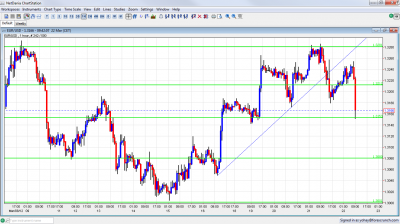Euro dollar is retreating from high ground and currently clinging to low support. Worries about Spain’s finances, Portugal’s prospects and global growth all weigh on the euro. In addition, fresh and forward looking PMIs are a big disappointment, including in strong countries. The recession is deeper than thought. We have quite a few events ahead, including speeches from both central bank heads.
Here’s an update on technicals, fundamentals and what’s going on in the markets.
EUR/USD Technicals
- Asian session: A slow session saw the pair consolidating above the 1.3212 line. The break lower began in the European session.
- Current range: 1.3150 to 1.3212.
- Further levels in both directions: Below: 1.3150, 1.3080, 1.30, 1.2945, 1.2873 and 1.2760.
- Above: 1.3212, 1.3280, 1.333, 1.3430, 1.3486, 1.3550 and 1.3615.
- Uptrend support lost: The pair clearly broke below uptrend support yesterday and another attempt to return just saw the pair trail under the line.
- 1.3150 is immediate support, but not so strong. 1.30 serves as strong support once again, and not only a round number.
- 1.3280 proved to be strong on the upside once again. Yet another breakout attempt failed.
Euro/Dollar sliding on new worries – click on the graph to enlarge.
EUR/USD Fundamentals
- 8:00 French Flash Services PMI. Exp. 50.6. Actual 50 points.
- 8:00 French Flash Manufacturing PMI. Exp. 50.4 points. Actual 47.6. Big disappointment.
- 8:30 German Flash Services PMI. Exp. 53.1 points. Actual 51.8 points.
- 8:30 German Flash Manufacturing PMI. Exp. 51.1 points. Actual 48.1 points – big disappointment – return to contraction.
- 9:00 Euro-zone Flash Services PMI. Exp. 59.3 points. Actual 48.7 points.
- 9:00 Euro-zone Flash Manufacturing PMI. Exp. 49.6 points. Actual 47.7 points.
- 10:00 Euro-zone Industrial New Orders. Exp. -2%.
- 12:30 US Jobless Claims. Exp. 353K.
- 14:00 Belgian NBB Business Climate. Exp. -6.6 points.
- 14:00 US OFHEO HPI. Exp. +0.2%.
- 14:00 US CB Leading Index. Exp. +0.6%.
- 14:00 US FOMC Member Daniel Tarullo talks.
- 15:00 US Consumer Confidence. Exp. -20 points.
- 16:00 ECB President Mario Draghi talks. Systemic risk is the discussion.
- 16:45 US Federal Reserve Chairman Ben Bernanke talks (2nd part of the lecture series).
For more events later in the week, see the Euro to dollar forecast
EUR/USD Sentiment
- Spanish worries: Citigroup chief economist said that the chance of a Spanish default is now higher. This joins the persistent rise in Spanish yields. Europe remains very fragile. A general strike is planned in Spain on March 29th.
- Recession looms: Is the LTRO euphoria behind us? Fresh purchasing managers’ indices are very worrying, and point to a deeper recession than thought. A “mild recession” seems optimistic once again.
- Portugal in trouble: There are heavy doubts if Portugal could return to the markets anytime soon. A second bailout program is certainly on the cards. Even worse, this may not be enough, and the peripheral country might be needing a restructuring similar to Greece.
- Dollar returns to safe haven status: Perhaps the changes in correlations were temporary. The dollar not only returns to a safe haven currency, but it can quickly return to rise when stocks fall and when doubts over the whole world return.
- China slows: The unofficial HSBC Flash Manufacturing PMI dropped deeper in contraction zone to 48.1 points. Many find Chinese figures hard to believe, yet HSBC”s number and comments from Australia’s BHP regarding lower demand from the economic giant are taken more seriously. Fresh figures showed more drops in real estate prices in the economic giant. Shifting from an export based economy to domestic consumption isn’t easy, and this has an effect on the global economy.
- FOMC Split: The FOMC left policy unchanged, as expected. This strengthened the US dollar significantly and triggered a dollar storm. The statement included an acknowledgement of higher oil prices and a more upbeat wording regarding employment, such as “the unemployment rate has declined notably”. What’s next? Several FOMC members have spoke lately and each one has his own message. Some want to exit soon, while others are still considering QE3. Bernanke leans towards the dovish camp, but the prospects of QE3 still remain low. Apart from employment, also housing is an area of concern to the Fed. We will get some data today.
- Greece pays its debt: March 20th was the dreaded day of Greek bond repayment. After the IMF joined the Eurogroup and gave the final approval to the second Greek bailout, Greece paid the money, mostly to the ECB. A fresh troika reports see Greece missing 2013 targets already, with more austerity needed after the elections. A projection from the Bank of Greece sees deep recession and a third bailout is certainly an option. Nevertheless, the situation is now calm around Greece.
- PSI – deadline open for foreign law bonds: Greece completed the PSI for Greek law bonds. The new ones are already trading at a quarter of a euro on the euro, reflecting a high chance of another default. CDS payments were settled yesterday. There is a small portion of bonds under international law. The deadline for the PSI on these bonds is March 23rd.
- Iran conflict heating up: In an unprecedented move, SWIFT announced it will cut off Iranian financial institutions from Saturday. This joins heightened rhetoric in Israel and elsewhere, and keeps oil high. See 5 signs that a war with Iran is getting closer.
- Draghi warns about inflation: The ECB left rates unchanged and made no policy changes. In the press conference, Draghi was very satisfied with the LTROs. He also warned about inflation, and said that the ECB has tools to fight it. Today’s CPI will provide more insight.

